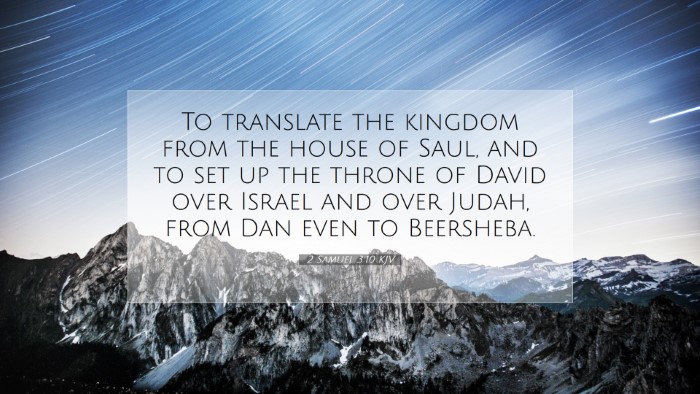Commentary on 2 Samuel 3:10
Verse Context:
2 Samuel 3:10 states, "To transfer the kingdom from the house of Saul, and to set up the throne of David over Israel and over Judah, from Dan even to Beer-sheba." This verse is situated during a tumultuous period in Israel's history, highlighting the transition of power from Saul's lineage to that of David. This transfer is not merely political; it is deeply theological, signifying God's sovereign choice and the establishment of His covenantal promises.
Historical Background
The backdrop of this verse is marked by the aftermath of King Saul’s death and the ensuing struggle for leadership over Israel. David had already been anointed king, but the kingdom was not yet consolidated under his rule due to deep-rooted tribal loyalties and divisions. The division between the house of Saul and the house of David sets the stage for a profound exploration of divine sovereignty, human ambition, and the fulfillment of promises made by God.
Theological Implications
This passage highlights several key theological insights:
- Divine Sovereignty: The transfer of the kingdom underscores God's control over history and His active role in directing the course of events in Israel. Matthew Henry emphasizes that it was God who raised David to power, affirming His purpose in choosing David over Saul.
- Covenant Fulfillment: The verse reflects the fulfillment of God's covenant with David, emphasizing the promises made in 1 Samuel 16 during David's anointing. Albert Barnes notes that this announcement of David's kingship is the outcome of God’s predetermined plan.
- Unity and Division: The mention of both Israel and Judah signifies the eventual unity of the twelve tribes under David’s reign. Adam Clarke points out that this unity is significant for Israel's identity and future stability, contrasting it with the fragmented state of the kingdom under Saul.
Commentary Insights
Matthew Henry: Henry asserts that the establishment of David’s throne represents God's judgment against Saul’s house, initiating a new era of leadership. He notes that David’s rise was not just a political maneuver but a divine orchestration, demonstrating God’s justice and mercy.
Albert Barnes: Barnes expounds that the phrase "to transfer the kingdom" indicates a clear and decisive act of God. He shares insights into the significance of the geographical references (Dan to Beer-sheba), illustrating the comprehensive nature of David’s dominion and the promise of a united Israel.
Adam Clarke: Clarke highlights the phrase "to set up the throne of David," emphasizing the prophetic implications of David’s reign. He connects this to the larger eschatological promise found in Isaiah and the New Testament, portraying David as a prefigure of Christ, the ultimate King.
Applications for Today
This passage serves as a rich source of reflection for contemporary believers:
- Understanding God’s Sovereignty: As believers navigate their lives, understanding that God is at work in the midst of chaos and uncertainty can bring peace and assurance.
- Seeking Unity: In today's divided church and society, this verse calls for a pursuit of unity under the leadership of Christ, reflecting the coming together of the tribes of Israel under David.
- Reflecting on Leadership: Pastors and leaders can glean from the qualities that set David apart—his reliance on God, his humility, and his commitment to justice. This challenges leaders to reflect God’s character in their own leadership models.
Conclusion
2 Samuel 3:10 is not just a historical marker but a profound declaration of divine sovereignty, covenant fulfillment, and the nature of true leadership. By examining the insights from public domain commentaries and applying them to contemporary contexts, we gain a deeper understanding of God’s overarching narrative in Scripture and His active involvement in our lives today. This realization encourages us to trust in God's promises and to pursue unity and faithful leadership in our communities.


